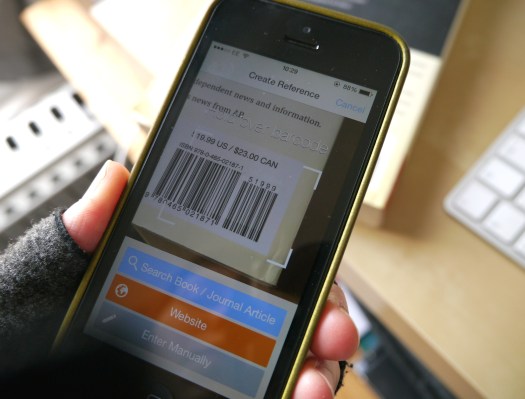The copy-and-paste generation has another tedium-busting digital tool in its arsenal: RefME is a book-barcode scanning app that speeds up the task of creating, formatting and managing citations, references lists and bibliographies of academic source material.
The app, available on the web as well as on iOS and Android, has been winning friends among students and academics since it launched its free service back in January. The London-based startup says it’s picking up an average of 10,000 new users per day, with 800,000 registered users in total at this point. User growth thus far has been through some targeted digital marketing focusing on university campuses and via word of mouth.
RefME takes the tedium out of creating reference lists by letting users either scan a book’s barcode with their smartphone to grab the relevant info, or doing a manual search for the book title, author or ISBN number and having the app generate the citation.
Notes and quotes can be added to reference list items. And lists are synced via RefME’s cloud service so they can be worked on from different devices.
As well as the usual suspects of books and journals, RefME supports a wide range of other reference types such as films, webpages, speeches, interviews, legal cases and more. It also supports automating citations in more than 7,000 academic formats. So, in short, that’s a whole lot less thesis-based headache.
What we’re doing is crowdsourcing validated knowledge
Co-founder Ian Forshew says the product sits between legacy referencing tools such as Endnote, which were designed for “a really niche researcher market”, and more simple citation tools “that can only cope with one or two of the citation formats and are not necessarily that accurate”.
“I think we’re the first out and out tech company that has gone after trying to solve this problem in a really tech way — of creating a really user friendly, super accurate citation tool,” he adds.
RefME is announcing a $5 million seed funding round today, led by education giant GEMS Global, itself owned by private K-12 education company Varkey Group, which put in $4 million of the financing. The other $1 million was raised in January 2014 from angel investors but is being announced now.
The startup says it will be using the seed funding to invest in its engineering and data teams — it currently has a team of 36 in its London office — and scale its global presence. It will also be raising a Series A soon. “It’s very much a go faster plan because of the size of the market,” says Forshew.
How does a free referencing tool become a money-making business? In a word: data. RefME is focusing on vertical search and on garnering valuable intel on the reference works that students are using most — analytics which it will be able to feed back to universities, institutions and publishers down the line. It argues universities are spending millions per year buying textbooks without having good visibility on which books are most useful.
“What we’re doing is crowdsourcing validated knowledge,” Forshew tells TechCrunch. “Our users are pinpointing where they find information that’s useful to them. We then have a lot of context around their behaviors, the notes they’re making about that information, where they go after they’ve found that information, the impact it has on their learning outcomes.
“And then we’re using it… to provide a huge amount of value to the education world — to further education institutions. To publishers. But also, more widely, it has the impact to have a pretty fundamental change to the way people search — because we’re able to tell people, or almost predict, the information that’s most useful for them. So rather than giving them 40,000 results like Google could, we could say ‘if these are the things you’re doing this is the piece of information you next need.”
RefME is sourcing reference data from various public and non-public databases, according to Forshew, but is also building its own database with the aim of fixing inaccuracies in publishers’ databases by noting crowdsourced changes — so, for instance, where multiple users are making the same edits to a citation.
“We’ve built our own API that looks across dozens of different databases, publisher databases or open source databases — some of which we license, some of which are freely available. The interesting thing that we’re doing is building our own database because each of these different sources are often incorrect and it’s actually a really big problem in the world of knowledge management, where this information is coming from, because the publishers’ data is incorrect. So what we do is crowdsource to build the perfect database.”
Should Google be concerned, given the precise data RefME is amassing — not to mention the scope of the market (Forshew talks about targeting 300 million students globally)? “We’re certainly doing some things that they don’t do, and that we’re uniquely positioned to do because of the nature of the data we have,” he says. “They’re definitely interested in what we’re doing.”
“RefME has huge potential to disrupt education, publishing and ultimately search as well,” adds Sunny Varkey, group chairman and founder of GEMS Education and Founder of Varkey Foundation, in a statement. “RefME learns what students and researchers all around the world discover and has the power to share this information. RefME has built a tool that helps validate information and ultimately shows where you’ve found knowledge. This is as important to education as it is to the web itself, and that is very compelling!”
